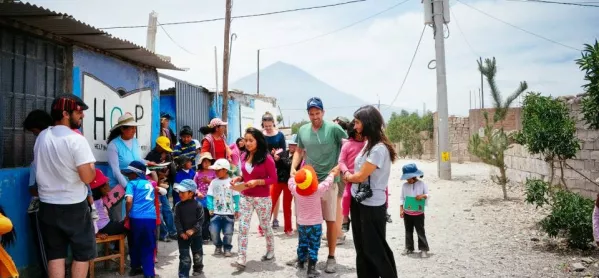When I was a teenager I took a trip to Guatemala. It was on this trip that I discovered my vocation to work as a global humanitarian. My dream was to one day work with the United Nations (UN).
After completing my masters, I worked for over a decade on humanitarian projects from Afghanistan to Ukraine to Peru, until I achieved my dream of working for the UN.
However, to everyone’s surprise, I changed careers after two months to start a career at an International Baccalaureate school in Lima.
I didn’t leave because I’d lost my love for humanitarian work. I left the UN because I wasn’t passionate about working on a project that focused on the weapons of mass destruction, while I felt there were other more pressing developmental challenges.
Why the International Baccalaureate?
I first heard about the IB when co-directing an educational non-governmental organisation (NGO) called HOOP in a shantytown in the Andes mountains outside of Arequipa, Peru.
During a crowded bus trip descending from 2,400 meters above sea level back to Arequipa, a British volunteer spoke to me about the different Service Learning projects at her IB school.
I was immediately intrigued by working at an IB school and educating ‘generation Z’ with the skills that they could use to fight current global challenges.
So now, I am currently a geography teacher and university counsellor coordinator at an IB school. I get to be part of a team of international educators that follow the IB mission statement that aims to “develop inquiring, knowledgeable and caring young people”.
Is this so different from what I was doing before? Well, teaching does have its challenges but I feel my past experiences are a great fit with the IB programme.
By working in an IB school, I am part of an organisation that focuses on educating students through international mindedness, and an IB profile grounded on mutual respect and cultural awareness.
Three humanitarian principles at the core of the IB
1. Community focus
The part of the IB program with the strongest link to my humanitarian work is the Creativity Activity Service (CAS) program. I have been fortunate to be a teacher volunteer with the student-led CAS service project for two years.
The students have focused their Service Learning project on a small community called Ihuanco. Last year, I supported the student-led three-day project there, working on improving local facilities.
2. Critical thinking
As well as fostering this sense of community spirit, the IB helps create individuals who can make sense of the world around them. Something that is especially important at the moment.
The IB programme places emphasis on developing independent and critical thinking skills based on quality research and applying them when scrutinising global assumptions.
One lesson I have learned from my experiences in over 80 countries and in particular working with Peruvian economist Hernando de Soto, is that as global individuals we need to be critical of what we hear and read from the media and governments.
3. Sustainability
The IB recognises the importance of training future generations to manage global challenges, sought by the UN’s Sustainable Development Goals (SDGs).
The SDGs are the foundation of the IBDP Geography workshop and highlighted throughout the geography DP syllabus. The SDGs are the roadmap to sustainable development and, like their predecessor the Millennium Development Goals, they will need a new set of global goals in 2030.
Education with extra purpose
As a teacher, I feel I can help to equip generation Z with skills to fight climate change, eradicate poverty, improve global education and combat social and income inequality.
And it doesn’t stop there. The IB geography syllabus includes relevant 21st-century global issues, such as cybersecurity, drone technology and transboundary pollution.
Thanks to my previous humanitarian work I have direct experience on these topics. In my lessons, I’m able to speak about my work with the EastWest Institute on projects in Afghanistan, Abu Dhabi, Pakistan and Central Asia and at the second annual Cyber Security Conference in London.
Working at an IB school has allowed me to continue my humanitarian vocation in another form. I can volunteer with NGOs during my holidays; support student-led projects with NGOs, such as TECHO and Operation Smile; and train future leaders who can work on global sustainability.
Brad Brasseur is a humanities teacher and university counsellor coordinator at a British international school in Lima, Peru. He tweets at @brbrasseur




